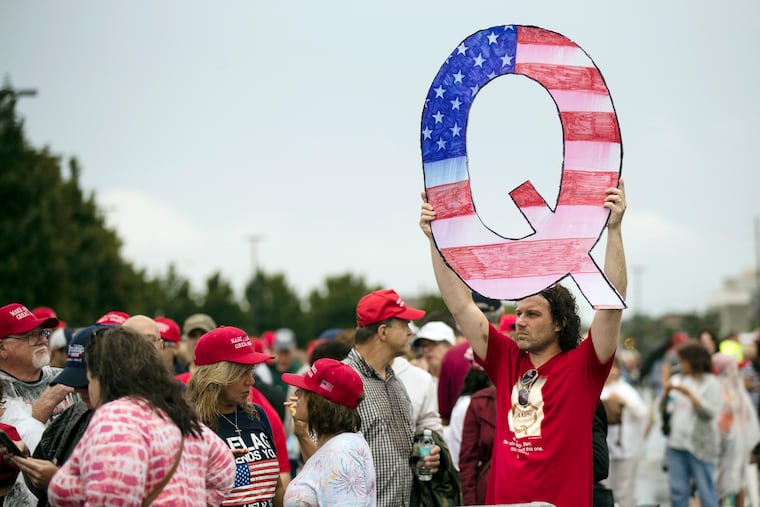FBI calls QAnon a domestic terrorist threat. Two Pa. Congress members voted not to condemn it. | Editorial
By refusing to condemn QAnon, elected officials are sending a dangerous signal to a violent movement.

Last week, the U.S. House of Representatives voted to condemn the online conspiracy movement QAnon. It should have been an easy vote considering that the FBI has labeled QAnon a domestic terrorist threat. And for the majority of the 435 House members, it was. But troublingly, 18 representatives voted against the resolution. More concerning: Two of the 17 Republican “nay” votes came from Pennsylvania.
Rep. Scott Perry, from south-central Pennsylvania, and Rep. Mike Kelly, from northwest Pennsylvania, voted no on a resolution that “condemns QAnon and rejects the conspiracy theories it promotes.” Perry did not respond to a request for comment, but Kelly explained in an email to this board: “Congress need not spend its time condemning Americans for speech it doesn’t like.” Last year, both Kelly and Perry voted in favor of a resolution condemning anti-Semitic speech that came in response to comments by Rep. Ilhan Omar of Minnesota.
Perry and Kelly are aligned with President Donald Trump, who has also refused to condemn QAnon. When asked directly about the conspiracy in August, Trump responded, “I don’t know much about the movement other than I understand they like me very much, which I appreciate.” He added: “I’ve heard these are people that love our country.”
The origin of QAnon is allegedly an anonymous Trump administration insider with the highly classified Q clearance. Starting in October 2017, “Q” started sending coded messages in order to take down a satanic cabal of pedophile elites that engages in global child trafficking. This cabal supposedly includes the Clintons, the Obamas, and the rich and famous in Hollywood. Trump is, according to Q, the only one who can stop them.
Because QAnon is so over the top, it is easy to dismiss it as a fringe confined to the darkest places on the internet. But that is far from true. There have been multiple violent incidents inspired by QAnon, and at least one murder. Moreover, QAnon has been hijacking the serious issue of child trafficking. In August, QAnon supporters held rallies in more than 200 cities across the country under the banners of “Save the Children” and “Freedom for Children” — language that makes the conspiracy theory seem more palatable for newcomers.
» READ MORE: QAnon giving America a scary look at what a ‘Biden resistance’ would look like in 2021 | Will Bunch
Perhaps the scariest part of QAnon is its growing presence in electoral politics. Media Matters has been tracking candidates in this election cycle who explicitly expressed support for QAnon. Pennsylvania is also a part of this list. In the Republican primary for Congress in two Pennsylvania districts, QAnon candidates threw their hat in the ring — one lost to Rep. Brian Fitzpatrick, and the other dropped out and endorsed Rep. Perry.
There are at least 25 QAnon candidates on the ballot in general election congressional races — two in Delaware and one in New Jersey. While most are long-shot candidates, Georgia is likely to send a QAnon believer to Congress.
By refusing to condemn QAnon, elected officials like Pennsylvania’s Perry and Kelly are sending a dangerous signal. Pennsylvania has been spared from a QAnon candidate on the ballot this election. Without a concentrated effort to muck out QAnon from our politics, the commonwealth might not be so lucky next cycle.